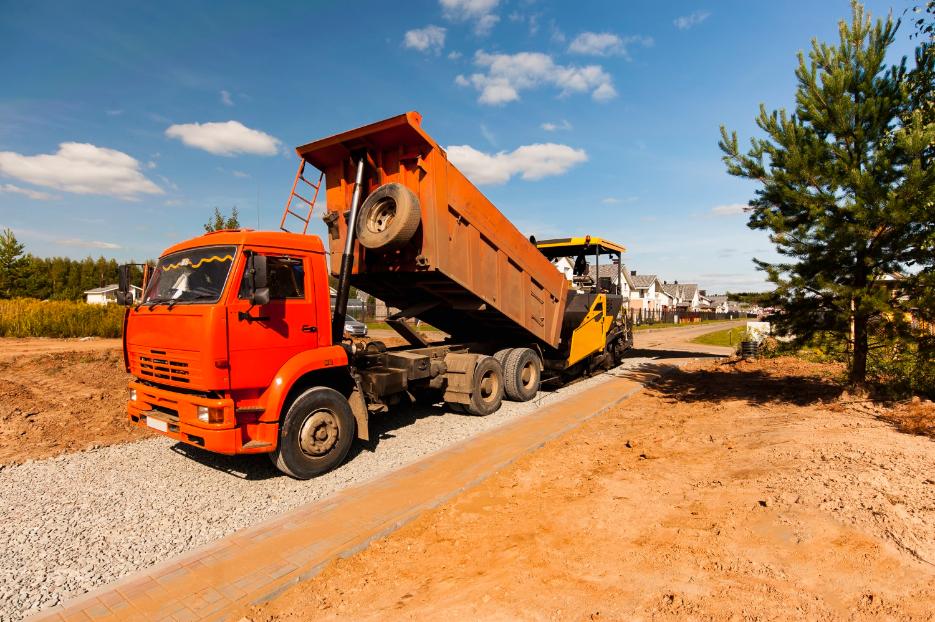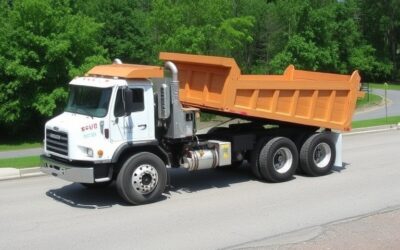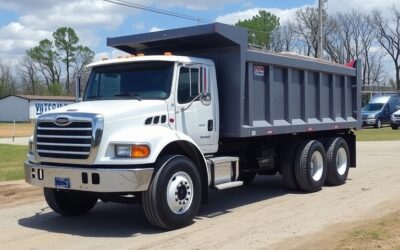Dump trucks are critical players in industries like construction, mining, and waste management. These trucks carry heavy loads and navigate challenging terrains, making them prone to accidents, especially tipping. Tipping accidents can wreck trucks, destroy loads, and even cause serious injuries or fatalities. Understanding how to prevent these accidents is critical for safety.
Understanding the Risks in Dump Truck Operations
Operating dump trucks comes with several risks, primarily due to the nature of their work and the loads they carry. The biggest danger? Tipping over. This can happen if the load is unevenly distributed or if the truck travels over rough terrain. When a dump truck tips, the consequences can be severe, resulting in damage to the truck, loss of the load, and potential injuries to the operator and others nearby.
Another significant risk involves the truck’s hydraulic system. A hydraulic failure while raising or lowering the bed can make it drop without warning. This sudden movement can result in accidents, including tipping or dumping the load unexpectedly. Regular maintenance of the hydraulic system is crucial to prevent such failures.
Driving conditions also contribute to operational risks. Dump trucks often operate in challenging environments, such as construction sites or mines, where the ground can be uneven and unstable. Poor weather conditions, like rain or snow, can further complicate these operations, making the truck more prone to slipping or losing control. Drivers must be trained to handle these conditions safely to reduce the risk of accidents.
How Anti-Tip Technology Works
Anti-tip tech keeps dump trucks from tipping by constantly monitoring and adjusting stability in real time. This technology uses a combination of sensors and control systems to detect when a truck is at risk of losing balance. If the truck leans too far, the system kicks in to correct the imbalance.
One primary component of anti-tip technology is the tilt sensor. This sensor continuously measures the angle of the truck bed and the truck itself. If the angle exceeds a safe threshold, the system triggers an alert to the driver and initiates corrective actions, such as lowering the truck bed back to a safer position. This immediate response helps prevent tipping before it can occur.
Another key element is the control unit, which processes data from the tilt sensors and other inputs, like load sensors and speed monitors. The control unit uses this information to make real-time adjustments to the truck’s operations. It can adjust the hydraulic system to lower the bed or even control the truck’s brakes to slow it down and stabilize the load.
Together, these components create a comprehensive system that actively works to maintain the stability of dump trucks. By automatically detecting and addressing potential tipping points, anti-tip technology significantly reduces the risk of accidents, ensuring safer operations in challenging environments.
Benefits of Using Anti-Tip Technology in Dump Trucks
Anti-tip technology offers numerous benefits that enhance the safety and efficiency of dump truck operations. The biggest win? Slashing the risk of tipping accidents. By automatically detecting and correcting imbalances, this technology ensures that the truck remains stable, even when operating over uneven terrain or carrying an uneven load. This proactive system cuts down accidents, protecting both operators and their equipment.
Another major benefit is increased operational efficiency. When drivers can rely on anti-tip technology to maintain stability, they can focus more on their primary tasks, such as loading and unloading materials. This leads to smoother operations and can improve productivity. Moreover, the reduced risk of accidents means less downtime for repairs and maintenance, further enhancing overall efficiency.
Anti-tip technology also contributes to the longevity of the truck. By preventing accidents and reducing stress on critical components like the hydraulic system and suspension, this technology helps minimize wear and tear. This results in lower maintenance costs and extends the lifespan of the vehicle, providing long-term savings.
Best Practices for Implementing Anti-Tip Technology
Implementing anti-tip technology in dump trucks requires careful planning and execution to ensure optimal performance and safety. Here are some best practices to consider:
- Choose the Right System: Make sure your anti-tip tech matches your dump truck model. Whether it’s frameless, roll-off, or frame type, select a system designed to meet the particular needs of your vehicle.
- Thorough Training: Thoroughly train operators on how to respond to the anti-tip system. Make sure they understand the alerts and signals generated by the technology and know the appropriate actions to take.
- Regular Maintenance: Just like any other piece of equipment, anti-tip technology requires regular maintenance to function correctly. This includes checking sensors, control units, and hydraulic systems regularly to ensure everything is in working order.
- Monitor and Evaluate: Continuously monitor the performance of the anti-tip system and evaluate its effectiveness. Collect data on incidents and near-misses to identify any areas for improvement. Adjust settings or upgrade components as necessary to enhance performance.
- Integrate with Other Safety Measures: Use anti-tip technology in conjunction with other safety measures, such as proper load management and safe driving practices. Combining multiple safety strategies ensures a comprehensive approach to maintaining stability and safety.
Conclusion
Preventing dump truck accidents isn’t just important—it’s crucial for keeping your operation safe and efficient. Understanding the risks inherent in dump truck operations and leveraging advanced anti-tip technology can make a significant difference. By implementing this technology, we can dramatically reduce the risk of tipping accidents, increase operational efficiency, and extend the lifespan of the trucks.
Adopting best practices when integrating anti-tip technology ensures that these systems perform optimally and provide the highest level of safety. Regular training, maintenance, and monitoring are key to maximizing the benefits of this technology.
For more information on how to prevent dump truck accidents with advanced anti-tip technology, visit Wink Anti Tip. Our cutting-edge anti-tip kits are designed for frameless, roll-off, and frame type dump trucks, ensuring comprehensive protection and safety for your operations. Contact Wink Anti Tip today to learn more about enhancing the stability of your dump trucks.





